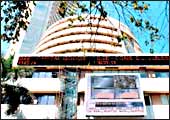 |
| Dizzy heights: Realty prices
are losing momentum now |
By all accounts, the last
10 years have been extraordinary for the global real estate market.
Prices have soared across the world. In the UK, house prices rose
more than 200 per cent between 1995 and 2005, in the US by 100 per
cent, and in other countries such as France, New Zealand, Australia
and Spain, between 100 and 170 per cent. In key Indian cities, prices
have risen much faster and in a shorter duration. Most of the recent
boom started well after 2000, coinciding with the boom in it and
ITEs outsourcing. That was also the time when the stock market (read:
the Bombay Stock Exchange Sensex) embarked on its spectacular bull
run, going from 3,000 or so to near 15,000 earlier this year.
As several thousands (if not millions) of Indians, many of them
in their 20s and 30s, saw their wealth grow, it was only natural
that they would begin buying what is considered the single-most
important material possession by middle class families: a house
of their own. Interestingly enough, as interest rates started
their march downwards on the back of benign inflation, buying
an apartment or a house became even easier for the Indian middle
class. But in less than five years, real estate prices appear
to have peaked. As our cover story points out, from Delhi to Bangalore
to Mumbai, the change in average price has slowed remarkably.
That means, while the bubble may not be close to bursting, it
is starting to correct. Don't expect prices to double like they
have over the last few years.
Recent research on global real estate markets reveals that there
is a strong correlation between macroeconomic factors and real
estate prices. For instance, in the case of North America, a 1
per cent increase in national income was found to result in 1-4
per cent increase in real house prices. A 1 per cent reduction
in interest rates was found to increase house prices by half to
1.5 per cent. Finally, a boom in stock market was also found to
result in higher house prices-by as much as 35 per cent in the
case of the UK over a three-year period.
The research findings are important to keep in mind, since two
of the three determinants are beginning to go against the real
estate market in India. Interest rates have started rising, making
mortgage instalments expensive for buyers. Also, the stock market
has begun to fall and the short-term outlook doesn't look too
rosy (see the edit below). In fact, this may be the beginning
of a vicious cycle that comes back to haunt the property buyer.
D-Street Blues
| 
|
| On a roller coaster: But
don't write it off yet |
Was it the budget? Or was
it china? It's easy to blame last fortnight's sell-off on Dalal
Street on Finance Minister P. Chidambaram's Budget, after all the
Sensex shed 541 points on B-day itself, even as he was delivering
his speech in Parliament. In fact, the Sensex's decline had more
to do with what was going on in the global markets-a massive melt-down
on the Shanghai Stock Exchange that cascaded into a worldwide plunge
in stocks, including Indian shares. The world's stock markets are
today more integrated than ever before. So a shock in one market
gets quickly transmitted to others.
Yet, India's stock market may be more prone to wild swings than
most. Statistics show that the Indian equity market has been historically
more volatile than the world average and it may be one reason
why the reaction to last fortnight's rumblings on the Shanghai
bourse were so pronounced in Mumbai, where, while most global
markets fell, the Sensex declined the most. Also, foreign investors
have steadily increased their presence in the Indian market with
the number of such investors and the funds they have infused in
India's capital markets growing steadily. This has its downside.
Global fund managers often look at a region-say, Asia-in a holistic
manner and decide to invest or sell generically in that area.
So, even if nothing has changed materially about the prospects
of Indian businesses, their stocks can suffer from collateral
damage if a sell-off happens elsewhere, in this case, China.
India's stock market has, since 2006, outpaced the world average
and while cheers have greeted the Sensex's rise, many experts
feel that market may have become overheated and that the time
was ripe for a correction. Already, pundits and punters alike
are predicting the next "psychological" bottom for the
Sensex, ranging from 9,000 to 11,000. Still, it would be premature,
naïve even, to write off the Indian equity story. The next
couple of quarters could see companies face pressure on their
margins and profit as the impact of higher interest rates kicks
in and inflation induces cooling off of some demand. But it is
unlikely to see interest in Indian stocks wane. Who would not
want to stay invested in an economy that is growing the fastest
in the world?
Let's Cut Out the Hype
 |
| FM Chidambaram (centre):
Read my lips, they are sealed |
What do you say after everything
that had to be said has already been said? You write a third edit.
Ever since Finance Minister P. Chidambaram presented Budget 2007,
you've been bombarded with "exclusive" analyses of and
learned editorials on its various features. So, we will refrain
from adding to the voluminous body of literature on the subject
(we have said what we had to say in the Special Budget Edition dated
March 2007); let us take any additional insights we might have been
able to offer as read.
But there's one aspect that's largely escaped the attention
of the pundits. Yes, we're talking of the hype and expectations
that build up in the run-up to every Budget; it's a self-propagating
cycle-driven largely by media houses in search of fickle eyeballs
(and here, we too plead mea culpa, lest we be accused of being
blind to our own "contribution" to this phenomenon).
If one financial daily comes out with an "exclusive"
on how "top-level" or "informed" sources have
disclosed on condition of anonymity that the exemption limit on
personal income tax will be raised to Rs 1.5 lakh, its competitor
immediately follows this up with a "scoop" on how corporate
tax rates will be reduced. Not one of the reports cites any credible
source; and there are no "on record" quotes. We hasten
to add that we are not for one moment doubting the honesty of
the reporters concerned. It's just that the Budget-making process,
being hush-hush and secretive, lends itself to speculation and
misinterpretations. Then, this is also the time when journalists
turn lip and thought readers. Every innocuous statement of the
Prime Minister, the Finance Minister, the Chairperson of the UPA,
of sundry Left leaders (who have their own agendas) is scanned
for hints, nuances and hidden meanings and interpreted as being
pointers to what the Budget documents may hold.
The stock markets pick up the cues from these and its own sources
and drive the markets up or down depending on how it perceives
these "insights" and "scoops" to impact particular
industries and companies.
It's almost as if everyone involved is playing an elaborate
derivatives trading game based on the underlying "asset value"
of the expected pronouncements. What is lost in all this hype
is the fact that the Budget is merely a statement of accounts
of the government. As Chidambaram, and Yashwant Sinha before him,
has said on several occasions (to BT and other publications),
the era of the Big Bang Budget is over. Policy issues are now
increasingly being delinked from the budgetary process. That's
how it is in mature economies, where the statements by the central
bank chief are considered more important than those of the Finance
Minister. Will India get to that stage anytime soon? Going by
empirical evidence, it seems unlikely.
|







